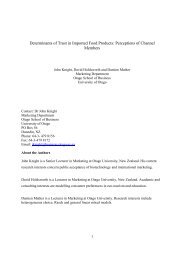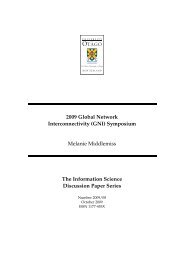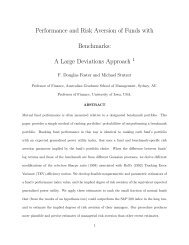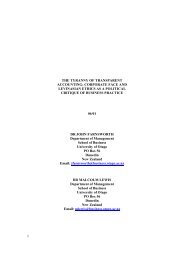Where is R2P grounded in international law? Anne-Marie Judson A ...
Where is R2P grounded in international law? Anne-Marie Judson A ...
Where is R2P grounded in international law? Anne-Marie Judson A ...
You also want an ePaper? Increase the reach of your titles
YUMPU automatically turns print PDFs into web optimized ePapers that Google loves.
obligation of that state”. 135 The <strong>in</strong>surrectional movement <strong>is</strong> not considered an act of<br />
the state because it sits outside and <strong>in</strong>dependent of the state until such time as it<br />
succeeds <strong>in</strong> over tak<strong>in</strong>g the government. As the ILC commentaries expla<strong>in</strong>; the state<br />
does not cease to ex<strong>is</strong>t at any po<strong>in</strong>t <strong>in</strong> the transition as a subject of <strong>in</strong>ternational <strong>law</strong>,<br />
only the party has changed and not the state itself. 136 Because the state <strong>is</strong> the only<br />
accountable <strong>in</strong>stitution <strong>in</strong> <strong>in</strong>ternational <strong>law</strong> the state rema<strong>in</strong>s to be attributable for the<br />
actions of the parties <strong>in</strong>volved. The ILC commentaries clearly po<strong>in</strong>t th<strong>is</strong> out when<br />
they say that the state <strong>is</strong> the only subject of <strong>in</strong>ternational <strong>law</strong> to which responsibility<br />
can be attributed.<br />
In light of th<strong>is</strong>, d<strong>is</strong>t<strong>in</strong>ction <strong>is</strong> not made between different types of movements on the<br />
bas<strong>is</strong> of legitimacy <strong>is</strong>sues <strong>in</strong> <strong>in</strong>ternational <strong>law</strong>. The focus <strong>in</strong> <strong>in</strong>ternational <strong>law</strong> <strong>is</strong><br />
directed at the specific conduct of the parties at the time of their actions. 137 The ICJ<br />
reflected th<strong>is</strong> <strong>in</strong> an adv<strong>is</strong>ory op<strong>in</strong>ion <strong>in</strong> relation to Security Council Resolution 276<br />
when they said “physical control of a territory and not sovereignty or legitimacy of<br />
title <strong>is</strong> the bas<strong>is</strong> of state liability for acts affect<strong>in</strong>g other states”. 138 In the Bolivar Railway<br />
Company claim the court said that “the national <strong>is</strong> responsible for the obligations of a<br />
successful revolution from its beg<strong>in</strong>n<strong>in</strong>g, because <strong>in</strong> theory it represented ab <strong>in</strong>itio a<br />
chang<strong>in</strong>g national will, crystalliz<strong>in</strong>g <strong>in</strong> the f<strong>in</strong>ally successful result”. 139<br />
The French Company of Venezuela Railroads case also emphasized that the state cannot be<br />
held responsible for the acts of revolutionaries unless the revolution was successful<br />
s<strong>in</strong>ce the acts themselves <strong>in</strong>volve the responsibility of the state. 140 Unsuccessful<br />
<strong>in</strong>surrections are not covered under state responsibility because they do not <strong>in</strong>clude<br />
attribution to the state. The movement itself may come under <strong>in</strong>dividual crim<strong>in</strong>al<br />
135 League of Nations. (1930). Conference for the Codification of International Law . Hague: <br />
League of Nations <br />
136 See page 50 ILC commentaries (2001) <br />
137 See for example, Legal consequences for states on the cont<strong>in</strong>ued presence of South Africa <strong>in</strong> <br />
Namibia (South West Africa) Security Council Resolution 276 (1970) Adv<strong>is</strong>ory Op<strong>in</strong>ion ICJ reports <br />
(1971) page16 and p54, <br />
138 ibid see footnote 134 <br />
139 See Bolívar Railway Company claim (1903) UNRIAA, volume ix, (sales no 59.v5) page 445 and <br />
453 see also French company of Venezuela railroads case volume (1902) x (sales number 60.v4) <br />
page 285, 354 <br />
140 ibid Commentaries from the ILC (2001) page 51 <br />
<br />
51
















